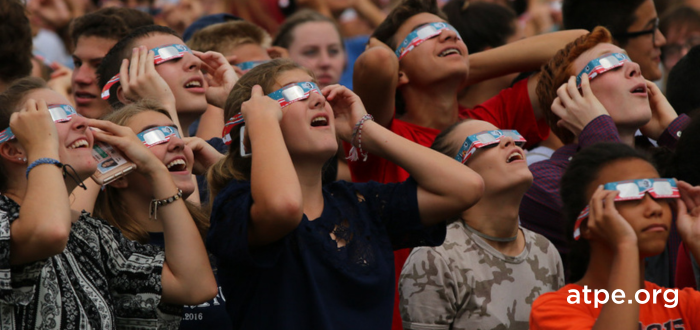Preparing for the Upcoming Solar Eclipse

Date Posted: 3/28/2024
A monumental solar eclipse will be visible in Texas April 8, and in a growing number of districts, students will have the day off to watch this event from home. This is due to the many visitors who are expected to flock to areas along the eclipse path, including some small towns and rural counties that are expecting an influx of potentially hundreds of thousands of people.
Around 12:30 p.m. CDT, the eclipse will be visible for between two and four minutes (weather permitting), and partial views could last over an hour depending on your location.
A total solar eclipse occurs when the moon comes between the sun and Earth, blocking all its light. We haven’t seen a total solar eclipse in the US since 2017, and it will be 20 years before such an event comes again—and this time not directly traveling over parts of Texas.
For the districts that do plan to remain open for the eclipse, many have planned learning activities to teach students about celestial events and how to safely view them.
This exciting astronomical event can provide a great opportunity for teachers and students to learn about the science of astronomy and the beauty of the natural world.
Here are some ways to prepare for the eclipse:
- Learn about eclipses: Science TEKS grade K-8 and High school Astronomy courses all connect to objects in the sky, patterns, orbits and eclipses. Visit the link below to plan for eclipse related activities in your classroom.
- Safety first: It is important to remind students never to look directly at the sun, especially during a solar eclipse. Failure to do this can lead to “eclipse blindness” or retinal burns. One can only safely view the eclipse using solar eclipse glasses that meet ISO standards or other appropriate viewing methods. If you don't already have glasses, you and your students can make them with the help of the NSTA Solar Eclipse Guide for Educators.
- Plan ahead for increased traffic and crowds: It is inevitable, with a natural phenomenon of this caliber, that people from far and wide will make the trek to parts of the state to experience optimal viewing of the total solar eclipse. Anticipate higher traffic on highways and increased crowds in your area.
- Attend an event: Many cities and towns will hold public events for the eclipses. If your district is closing school for the eclipse, encourage your students and their families to attend these events to view the eclipse with others, learn from experts, and engage in educational activities.
- Share your experience: If your school is in session for the big event, document your classroom’s experiences of the eclipse. You can take photos, videos, and notes to create a record of the event to share with other classes.
Interested in learning more about the upcoming solar eclipse? The following links offer a variety of resources for your classroom:

